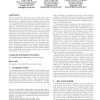Free Online Productivity Tools
i2Speak
i2Symbol
i2OCR
iTex2Img
iWeb2Print
iWeb2Shot
i2Type
iPdf2Split
iPdf2Merge
i2Bopomofo
i2Arabic
i2Style
i2Image
i2PDF
iLatex2Rtf
Sci2ools
136
click to vote
SIGIR
2012
ACM
2012
ACM
Robust ranking models via risk-sensitive optimization
Many techniques for improving search result quality have been proposed. Typically, these techniques increase average effectiveness by devising advanced ranking features and/or by developing sophisticated learning to rank algorithms. However, while these approaches typically improve average performance of search results relative to simple baselines, they often ignore the important issue of robustness. That is, although achieving an average gain overall, the new models often hurt performance on many queries. This limits their application in real-world retrieval scenarios. Given that robustness is an important measure that can negatively impact user satisfaction, we present a unified framework for jointly optimizing effectiveness and robustness. We propose an objective that captures the tradeoff between these two competing measures and demonstrate how we can jointly optimize for these two measures in a principled learning framework. Experiments indicate that ranking models learned th...
Related Content
| Added | 28 Sep 2012 |
| Updated | 28 Sep 2012 |
| Type | Journal |
| Year | 2012 |
| Where | SIGIR |
| Authors | Lidan Wang, Paul N. Bennett, Kevyn Collins-Thompson |
Comments (0)

